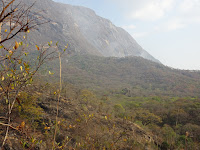Beauty of the Mulanje Mountains
Mulanje Mountains is the highest mountains in Malawi, with its highest peak reaching just above 3000 meters above sea level. The lower part of the mountains are moderate steep, and covered with a combination of indigenous and pine trees.
We stayed at a lodge belonging to the Presbyterian Church at the foothills of the mountain, in a self-contained chalet.
While our hikes during the two days were limited to staying within the forest-covered lower part of the massif, we experienced the greatness of the nature. The Waterfall, with its natural pool for swimming just below, was the playground for a group of scouts who stayed next-door to us. Their joy of experiencing the nature, and enjoying swimming in the clear and chilly pond was refreshing. Scouting is a global movement, and we clearly saw that Malawian girls and boys enjoyed life in Mother nature the same way scouts in Norway enjoy outdoor life!
The scout group under the Waterfall
During our hike we met several men who obviously cut trees and brought firewood back to the market in Zomba and surroundings. Every day they were climbing the steep ascent from Zomba. You will have an impression of the view from the "Emperor's Viewpoint", a place visited by Emperor Haile Sellaise in 1965.
View from the "Emperor's Viewpoint gives an impression of the climb from Zomba
Heavy load of firewood on its way
to the market
Thomas and Lawrence cutting wood for a living
Preserving precious forest areas is clearly in tension with creating livelihood for many families who do not see many other options for their upkeep. Government and many good forces obviously need to work on policies and practices that can remove this tension and create win-win situations.












